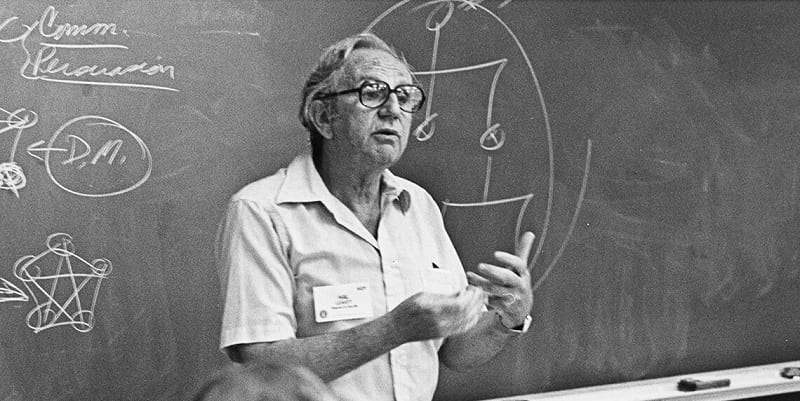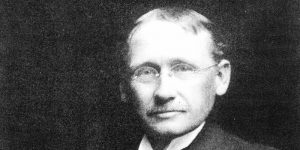Harold Leavitt biography and books

Harold Leavitt (Harold Jack Leavitt; 14 January 1922 – 8 December 2007) was an American expert and pioneer in the field of management psychology, lecturer, and author. Harold Leavitt is internationally known for his theory, the Leavitt’s Diamond, which is sometimes also referred to as Leavitt’s System Model. It is a concept that can be used to analyze the effects of organizational strategies.
He> additionally authored ‘Managerial Psychology,’ which is today translated in more than eighteen languages and still used by students around the globe who study organizational behavior.
Harold Leavitt biography
Harold Leavitt was born in Lynn, Massachusetts. He grew up in a large family consisting of a household of thirteen family members. Harold Leavitt first studied at Harvard University.
This is where he obtained his bachelor’s degree in 1943. Harold was, no matter what, driven to continue studying. After he finished his program at Harvard, Harold Leavitt immediately put in all effort to follow a master’s program.
As a consequence, Harold applied at Brown University, another leading university in the United States, where Harold Leavitt later obtained his master’s degree. Earning his master’s degree was not enough for Leavitt, because shortly after, he went to the Massachusetts Institute of Technology. It was in 1949 when Harold Leavitt earned a doctorate in industrial economics.
Leavitt started his career as a professor. In his time as a professor, he was additionally researching elements of management psychology. For example, he was continually researching personalities of leaders, how group members communicate with each other, how group decisions are made, and what the effects of hierarchical structures are on organizations as a whole.
The performed research of Harold Leavitt was not executed solely by himself. During his time as a professor, Leavitt closely collaborated with his exceptional students. As a result of the human resources, Leavitt conducted experiments to test his findings.
His publications are published in textbooks but also in various academic journals and business presses, such as The Journal of Psychology, Harvard Business Review, California Management Review, Oxford University Press, and Journal of Consulting Psychology.
Harold Leavitt’s publications were moreover concerned with how to create a great place to work where employees are engaged, feel valued, and thus, provide results that go beyond expectations. Examples of his books include but are not limited to Corporate Pathfinders, Hot Groups, and Top Down: Why hierarchies Are Here to Stay and How to Manage them More Efficiently.
His research was a life-long research, and since he lectured at different universities, his research was ongoing. Harold Leavitt taught at the University of Chicago, the Rensselaer Polytechnic Institute, Carnegie Mellon University, and Stanford University.
In this time, Harold Leavitt recorded, accumulated, and analyzed his findings. He was the first and thus, the pioneer, who identified that understanding the organizational environment is crucial to understand organizational behavior.
His view and thoughts about management psychology were worldwide demanded. It was for this reason also not rare that he traveled around the world to provide presentations and share his findings.
Harold Leavitt’s research positively influenced MBA program curriculums, which led to new programs that were designed based upon the latest information. The study of Leavitt has consequently impacted educational systems but also business management.
Leavitt had a positive personality and a proactive working attitude. His leadership style was an example for others. His colleagues and partners stated that Harold was a kind person, and it was nice to be surrounded by him. Harold was also known for his love for sweets. According to the people who he was surrounded by, Leavitt always took at least two desserts when he goes out for dinner.
Harold Leavitt was married twice in his life. His first wife was Gloria R. Leavitt, who died in 1985. In 1987, Harold married Jean Lipman-Blumen, also a well-known professor of organizational behavior. They remained married until his death. Harold has three children and nine grandchildren.
Harold Leavitt died in December 2007 at the age of 85. A memorial service was held in February 2008 at Stanford Memorial Church. Many people around the globe gathered to honor Leavitt. He was honored for his contributions to the field of management psychology, but moreover, he was admired for his personality and how he helped and treated others. Harold Leavitt and his family received a lot of support from the public.
Harold Leavitt quotes
- “We cling to hierarchies because our place in a hierarchy is, rightly or wrongly, a major indicator of our social worth.”
Books and publications
- 2007. Big organizations are unhealthy environments for human beings. Academy of Management Learning Education, 6(2), 253-263.
- 2005. Top down: Why hierarchies are here to stay and how to manage them more effectively. Harvard Business Press.
- 2003. Why hierarchies thrive. Harvard business review, 81(3), 96-102.
- 1999. Hot groups: Seeding them, feeding them, and using them to ignite your organization. Oxford University Press on Demand.
- 1996. The old days, hot groups, and managers’ lib.
Administrative Science Quarterly, 288-300. - 1991. Socializing our MBAs: total immersion? Managed cultures? Brainwashing?. California Management Review, 33(4), 127-143.
- 1989. Suppose we took groups seriously. Readings in managerial psychology, 410.
- 1989. Readings in managerial psychology. University of Chicago Press.
- 1989. Educating our MBAs: On teaching what we haven’t taught. California Management Review, 31(3), 38-50.
- 1987. Corporate pathfinders: Building vision and values into organizations. Penguin Group USA.
- 1983. Management and management education in the West: What’s right and what’s wrong. London Business School Journal, 8(1), 18-23.
- 1980. A case for the relational manager. Organizational Dynamics, 9(1), 27-41.
- 1978. Managerial psychology. Chicago University of Chicago Press.
- 1975. Beyond the analytic manager. California Management Review, 17(3), 5-12.
- 1973. organizational world.
- 1965. Handbook of organizations. Rand Mc Nally, 1144-1170.
- 1965. Applied organizational change in industry, structural, technological and humanistic approaches. Handbook of organizations, 264.
- 1964. Organizational psychology. Annual Review of Psychology, 15(1), 371-398.
- 1963. Some experiments in planning and operating. Management Science, 9(4), 574-585.
- 1962. Unhuman organizations. Harvard Business Review.
- 1960. Task ordering and organizational development in the common target game. Behavioral science, 5(3), 233-239.
- 1959. Management in the 1980’s. Journal of Occupational and Environmental Medicine, 1(4), 252-253.
- 1957. On the export of American management education. The Journal of Business, 30(3), 153-161.
- 1955. “Authoritarianism” and agreement with things authoritative. The Journal of Psychology, 40(2), 215-221.
- 1954. A note on some experimental findings about the meanings of price. The Journal of Business, 27, 205-205.
- 1951. Some effects of certain communication patterns on group performance. The Journal of Abnormal and Social Psychology, 46(1), 38.
- 1947. Group opinion as a predictor of military leadership. Journal of Consulting Psychology, 11(6), 283.
- 1944. The retention of verbal and of motor skills. Journal of Experimental Psychology, 34(5), 404.
How to cite this article:
Zeeman, A. (2019). Harold Leavitt. Retrieved [insert date] from Toolshero:https://www.toolshero.com/toolsheroes/harold-leavitt/
Original publication date: 12/14/2019 | Last update: 06/22/2023
Add a link to this page on your website:
<a https://www.toolshero.com/toolsheroes/harold-leavitt/”>Toolshero: Harold Leavitt</a>











